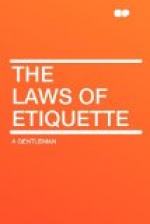If a plate be sent to you, at dinner, by the master or mistress of the house, you should always take it, without offering it to all your neighbours as was in older times considered necessary. The spirit of antique manners consisted in exhibiting an attention to ceremony; the spirit of modern manners consists in avoiding all possible appearance of form. The old custom of deferring punctiliously to others was awkward and inconvenient. For, the person, in favor of whom the courtesy was shown, shocked at the idea of being exceeded in politeness, of course declined it, and a plate was thus often kept vibrating between two bowing mandarins, till its contents were cold, and the victims of ceremony were deprived of their dinner. In a case like this, to reverse the decision which the host has made as to the relative standing of his guests, is but a poor compliment to him, as it seems to reprove his choice, and may, besides, materially interfere with his arrangements by rendering unhelped a person whom he supposes attended to.
The same avoidance of too much attention to yielding place is proper in most other cases. Shenstone, in some clever verses, has ridiculed the folly; and Goldsmith, in his “Vicar,” has censured the inconvenience, of such outrageous formality. These things are now managed better. One person yields and another accepts without any controversy.
When you are helped to anything at a dinner table, do not wait, with your plate untouched, until others have begun to eat. This stiff-piece of mannerism is often occurring in the country, and indeed among all persons who are not thoroughly bred. As soon as your plate is placed before you, you should take up your knife and arrange the table furniture around you, if you do not actually eat.
As to the instruments by which the operation of dining is conducted, it is a matter of much consequence that entire propriety should be observed as to their use. We have said nothing about the use of silver forks, because we do not write for savages; and where, excepting among savages, shall we find any who at present eat with other than a French fork?. There are occasionally to be found some ancients, gentlemen of the old school, as it is termed, who persist in preferring steel, and who will insist on calling for a steel fork if there is none on the table. They consider the modem custom an affectation, and deem that all affectation should be avoided. They tread upon the pride of Plato, with more pride. There is often affectation in shunning affectation. It is better in things not material to submit to the established habits, especially when, as in the present case, the balance of convenience is decidedly on the part of fashion. The ordinary custom among well bred persons, is as follows:—soup is taken with a spoon. Some foolish fashionables employ a fork! They might as well make use of a broomstick. The fish which follows is eaten with a fork, a knife not




